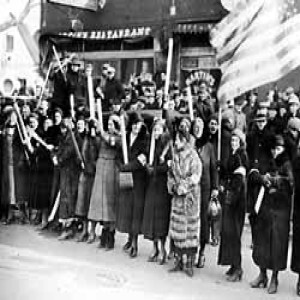

On this day in labor history, the year was 1937.
That was the day the Flint Women’s Emergency Brigades was founded.
Genora Johnson, a socialist, was a main leader of the Women’s Auxiliary Number 10 throughout the strike.
A different kind of auxiliary, it built the leadership skills of women through classes in labor history and public speaking.
It also set up a first-aid station and child-care center, raised strike funds and walked picket lines.
According to Janice Hassett, “the women moved beyond supporting the strike to participating in it.”
Fifty women signed up the next day.
By the end of the strike, over 300 women would join.
The women adopted an official uniform of red berets and red armbands.
They were armed with clubs to smash factory windows when police gassed sit-downers.
Their participation in the strike was heroic and their work continued after victory.
They sought to represent the interests of women autoworkers, who often found coworkers less than welcoming and experienced sexual harassment and occupational discrimination at the hands of supervision.
Many women autoworkers formed the core leadership of several chapters.
Historian Nancy Gabin notes that this was not always the appropriate arena for advocacy saying; “By encouraging women workers to participate in the auxiliaries, the UAW abdicated its responsibility to these workers.”
However, Johnson emphasized, “It was a radical change.... To give women a right to participate in discussions with their husbands, with other union members, with other women, to express their views... that was a radical change for those women at that time.”
More Episodes
All Episodes>>You may also like
Create Your Podcast In Minutes
- Full-featured podcast site
- Unlimited storage and bandwidth
- Comprehensive podcast stats
- Distribute to Apple Podcasts, Spotify, and more
- Make money with your podcast











